เพาะพันธุ์ปัญญา : นวัตกรรมการศึกษาที่ใช้ในการทำโครงงานฐานวิจัย (Research – Based Project)
สถาบันนวัตกรรมการเรียนรู้ มหาวิทยาลัยมหิดล


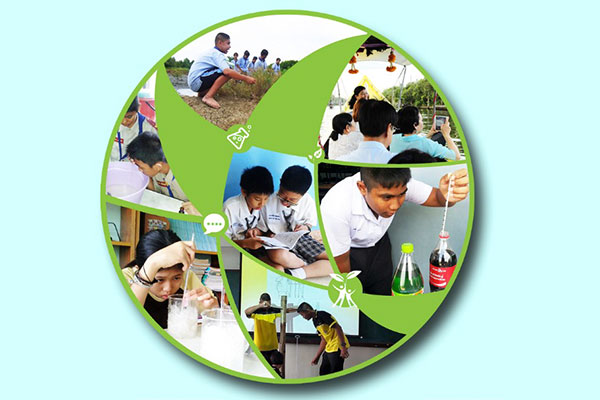
{:th}
เพาะพันธุ์ปัญญา : นวัตกรรมการศึกษาที่ใช้ในการทำโครงงานฐานวิจัย (Research – Based Project)
สถาบันนวัตกรรมการเรียนรู้ มหาวิทยาลัยมหิดล
ผลงานวิจัย :
นวัตกรรมการศึกษาที่ใช้ในการทำโครงงานฐานวิจัย (Research – Based Project)
ผู้วิจัย :
ผศ.ดร.ปิยะฉัตร จิตต์ธรรม
ผศ.ดร.น้ำค้าง ศรีวัฒนาโรทัย
ผศ.ดร.วัชรี เกษพิชัยณรงค์

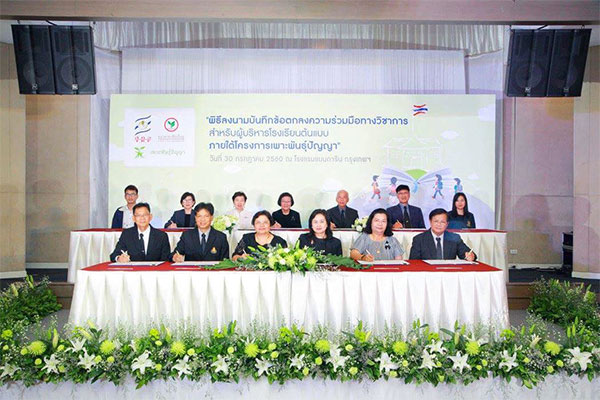
ศูนย์พี่เลี้ยงโครงการเพาะพันธุ์ปัญญา สถาบันนวัตกรรมการเรียนรู้ มหาวิทยาลัยมหิดล ได้รับทุนสนับสนุนจากสำนักงานกองทุนสนับสนุนการวิจัย และ บมจ.ธนาคารกสิกรไทย ในการทำวิจัยเชิงปฏิบัติการเพื่อหาคำตอบในการจัดการศึกษาเพื่อเพิ่มขีดความสามารถในการสร้าง “กระบวนการคิดอย่างมีระบบ” โดยเฉพาะกระบวนการสร้างความรู้ให้กับตนเองอย่างไม่รู้จบ โดยดำเนินงานร่วมกับโรงเรียนในพื้นที่จังหวัดสมุทรสงคราม สมุทรสาคร นครปฐม และกรุงเทพมหานคร จำนวน 10 โรงเรียน ในการยกระดับการทำโครงงาน (Project) ให้นำไปสู่การพัฒนาทักษะการคิดวิเคราะห์สังเคราะห์สร้างความรู้โดยผู้เรียนเอง โดยผู้วิจัยทำหน้าโค้ชครูที่จะเป็นผู้โค้ชนักเรียนออกแบบโครงงานฐานวิจัย (Research Based Project) ด้วยเครื่องมือ 4 ชุด ได้แก่ 1) เครื่องมือ พัฒนาฐานใจ คือ กิจกรรมจิตตปัญญาศึกษา ให้ครูเข้าใจตนเองและจิตวิญญาณความเป็นครู เปลี่ยนบรรยากาศห้องเรียนจากระบบใช้อำนาจมาเป็นระบบความสัมพันธ์แนวราบกับนักเรียน ทำให้เด็กรู้สึกปลอดภัย หลุดจากความกลัว กล้าที่จะคิด พร้อมก้าวเดินและเรียนรู้ไปด้วยกัน 2) เครื่องมือพัฒนากระบวนการคิดเชิงเหตุผล (cause-effect) ซึ่งเป็นผลงานวิจัยของโครงการนี้ ให้ครูสามารถใช้ออกแบบความคิดแบบ backward thinking ในการวิเคราะห์คำตอบของนักเรียน เพื่อประดิษฐ์คำถามใหม่ให้กับนักเรียน เป็นการใช้คำถามแทนการบอกความรู้ ถามเพื่อกระตุ้นให้นักเรียนคิดเชื่อมโยงสิ่งที่เรียนเข้าสู่เป้าหมายการเรียนรู้ที่สูงขึ้น จนร้อง “อ๋อ” ด้วยตนเอง 3) เครื่องมือการทำโครงงานฐานวิจัย คือการทำโครงงานของนักเรียนด้วยกระบวนการวิจัยภายใต้ประเด็นที่เกี่ยวข้องกับบริบทรอบโรงเรียน และ 4) เครื่องมือที่ทำให้เกิดการแลกเปลี่ยนเรียนรู้ คือ การสร้างชุมชนแห่งการเรียนรู้ (Professional Learning Community, PLC) ผ่านระบบ social media ที่ต้องมี feedback อย่างรวดเร็ว การเขียน reflection และทำ After Action Review (AAR) โดยมีพี่เลี้ยงพาทำ และกระตุ้นให้คิดเพื่อประเมินสิ่งที่เกิดขึ้นหรือความเห็นที่ต่างกันอย่างสร้างสรรค์ และให้เกิดการคิดเชิงบวก ที่จะต้องมีข้อสรุปให้เกิดการทำงานต่อไปด้วยตนเองในบริบทของตน
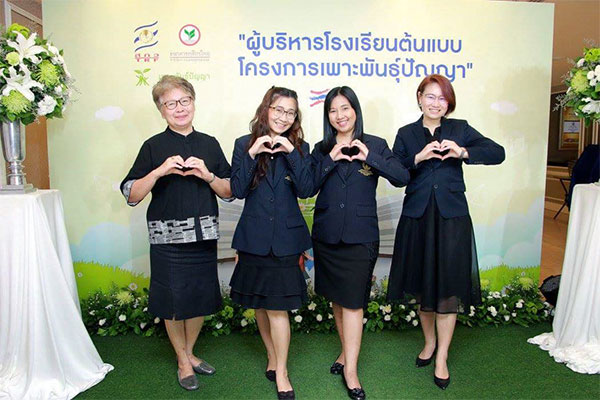
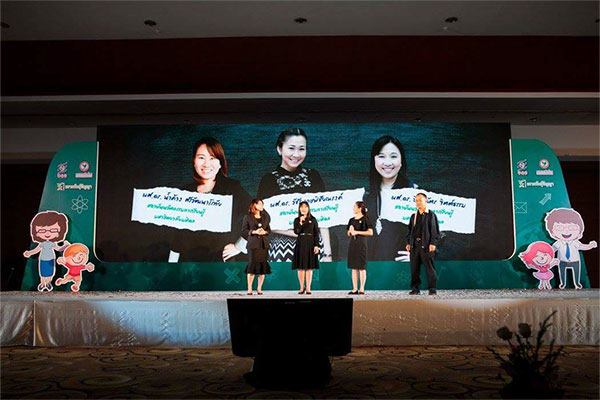
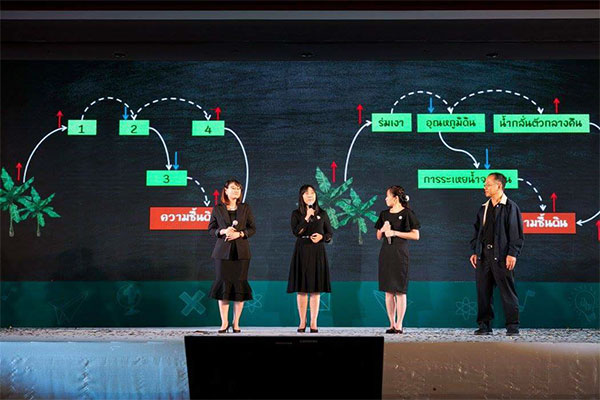
การนำไปใช้ประโยชน์ :
1.) ครูและนักเรียนที่เข้าร่วมโครงการ มีระบบคิดในวัฒนธรรมวิทยาศาสตร์ (คิดแบบผลเกิดจากเหตุ) มีทักษะการเรียนรู้และรู้จักสร้างปัญญาเองแบบไม่รู้จบ ซึ่งถือเป็นปัจจัยสำคัญต่อการผลักดันทรัพยากรมนุษย์ให้สามารถเพิ่มขีดความสามารถและศักยภาพต่อไป
2.) การเรียนรู้ผ่านการทำโครงงานฐานวิจัย มีความเป็นรูปธรรมในการทำให้นักเรียนเกิดทักษะแห่งศตวรรษที่ 21
3.) โรงเรียนที่เข้าร่วมโครงการอย่างน้อย 3 โรงเรียน มีการขยายผลทั้งโรงเรียนภายใต้การให้คำปรึกษาของศูนย์พี่เลี้ยง
รางวัลที่ได้รับ :
ผลงานวิจัยดีเด่นด้านสาธารณะ ประจำปี พ.ศ. 2557 จากสำนักงานกองทุนสนับสนุนการวิจัย (สกว.) (21 พฤษภาคม 2558)
การเผยแพร่ผลงาน :
• ปิยะฉัตร จิตต์ธรรม (2558). “เพาะพันธุ์ปัญญา…เรียนรู้และเติบโตอย่างช้าๆ กว่าต้นกล้าจะผลิใบ” ใน สุธีระ ประเสริฐสรรพ์ และคณะ (บรรณาธิการ) “สะท้อนคิดคือเรียน: ความรู้สึกในความงามที่ผลิบาน โครงการเพาะพันธุ์ปัญญาปี 2”. สงขลา: บริษัทนำสินโฆษณาจำกัด. หน้า 21-45.
• ปิยะฉัตร จิตต์ธรรม (2557). “พี่เลี้ยง…การเรียนรู้จากประสบการณ์นอกตำรา” ใน สุธีระ ประเสริฐสรรพ์ และคณะ (บรรณาธิการ) “รอยจารึก บนเส้นทางเพาะพันธุ์ปัญญา”. กรุงเทพ: สำนักงานกองทุนสนับสนุนการวิจัย. หน้า 407-416.
• ศูนย์พี่เลี้ยงโครงการเพาะพันธุ์ปัญญา มหาวิทยาลัยมหิดล (2559). “ก้าวข้ามสู่ความเปลี่ยนแปลง ของครูเพาะพันธุ์ปัญญา” 65 หน้า.
การติดต่อ :
ผศ.ดร.ปิยะฉัตร จิตต์ธรรม
สถาบันนวัตกรรมการเรียนรู้ มหาวิทยาลัยมหิดล
pjittam@gmail.com
{:}{:en}
Phophanpunya Research Project : Educational Innovations for Learning through Research – Based Projects
Institute for Innovative Learning, Mahidol University
Title :
Educational Innovations for Learning through Research – Based Projects
Researchers :
Asst.Prof.Dr.Piyachat Jittam
Asst.Prof.Dr.Namkang Sriwattanarothai
Asst.Prof.Dr.Watcharee Ketpichainarong


The Thailand Research Fund and Kasikorn Bank PCL. have supported Phophanpunya coaching and mentoring center at the Institute for Innovative Learning, Mahidol University, in action research aiming to promote “systematic thinking” and “self-constructing knowledge” in teachers of 10 schools located in Samut Songkhram, Samut Sakhon, Nakhon Pathom, and Bangkok. To achieve this objective, the researchers in this project coach teachers who subsequently coach students to improve critical and creative thinking skills during research-based project (RBP) design. There are 4 sets of activities for enhancing teachers’ skills in teaching RBP including (1) Contemplative education activity to help teachers to understand oneself and the spirit of the teacher. This activity helps teachers set the classroom up as a safe learning space and have horizontal relationship with students. Students would feel comfortable, be assertive, and have the will to learn; (2) A set of activities to develop thinking process skill called “Cause and Effect”. This set of activities could help teachers to design the lesson. Under the concept of backward design thinking, teachers will analyze students’ responses and use these responses to generate a new set of questions instead of providing the answer. These questions will stimulate students to think more and to link their own prior knowledge or experiences to a higher-level knowledge in an aha moment; 3) Research-based learning in which students conduct research projects related to their own school context; and 4) Professional learning community or PLC via both face-to-face and social media which provides good opportunities for teachers, for example, to share their own intrinsic knowledge, or to find better ways of solving some problems. In this community, the processes of writing reflection, providing constructive feedback, and conducting After Action Review (AAR) are facilitated by the researchers. The roles of the researchers are to encourage the teachers to be better teachers, be more creative, and think positively within their individual contexts.



Applied Research Project to Usage :
1.) Teachers and students who join the research project will be able to think scientifically, i.e. cause and effect, develop learning skills as well as know the way to construct knowledge, which are the major components for human development in the 21st century.
2.) Research-based learning provides concrete learning experiences for students to develop 21st century skills.
3.) At least three schools have adopted the RBL process schoolwide under the supervision of the researchers.
Award Grant related to the Project :
TRF Outstanding Award 2014 from Thailand Research Found on May 21, 2015.
Publishing :
• ปิยะฉัตร จิตต์ธรรม (2558). “เพาะพันธุ์ปัญญา…เรียนรู้และเติบโตอย่างช้าๆ กว่าต้นกล้าจะผลิใบ” ใน สุธีระ ประเสริฐสรรพ์ และคณะ (บรรณาธิการ) “สะท้อนคิดคือเรียน: ความรู้สึกในความงามที่ผลิบาน โครงการเพาะพันธุ์ปัญญาปี 2”. สงขลา: บริษัทนำสินโฆษณาจำกัด. หน้า 21-45.
• ปิยะฉัตร จิตต์ธรรม (2557). “พี่เลี้ยง…การเรียนรู้จากประสบการณ์นอกตำรา” ใน สุธีระ ประเสริฐสรรพ์ และคณะ (บรรณาธิการ) “รอยจารึก บนเส้นทางเพาะพันธุ์ปัญญา”. กรุงเทพ: สำนักงานกองทุนสนับสนุนการวิจัย. หน้า 407-416.
• ศูนย์พี่เลี้ยงโครงการเพาะพันธุ์ปัญญา มหาวิทยาลัยมหิดล (2559). “ก้าวข้ามสู่ความเปลี่ยนแปลง ของครูเพาะพันธุ์ปัญญา” 65 หน้า.
/Key Contact Person :
Asst.Prof.Dr.Piyachat Jittam
Institute for Innovative Learning, Mahidol University
pjittam@gmail.com